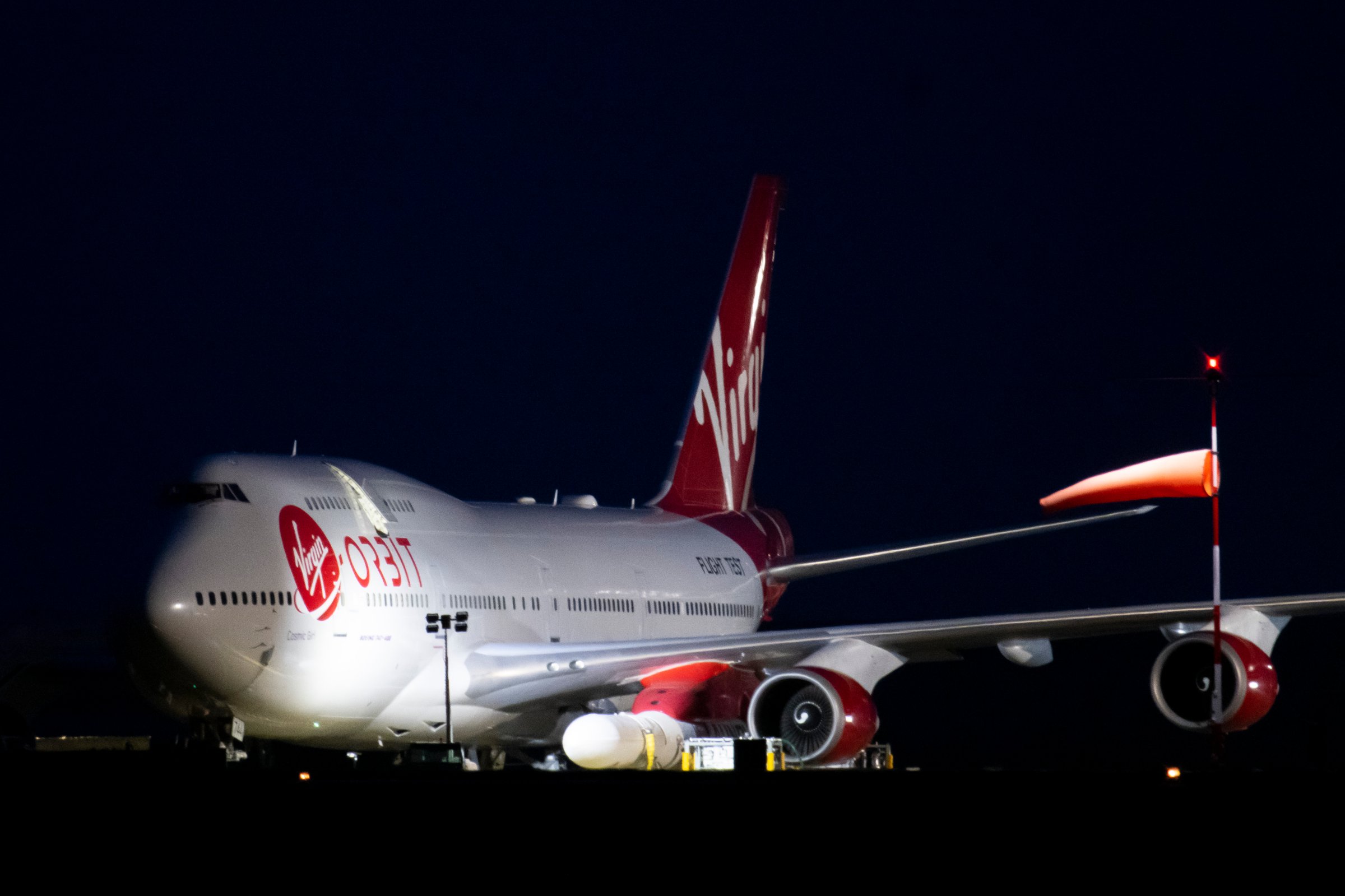
Not a lot of people have heard of Spaceport Cornwall in the U.K., but last night more than 2,000 paying ticket holders showed up there to watch what was supposed to be the first orbital space launch from British soil. The payload: nine different satellites from both the military and the private sector. The launch company: Virgin Orbit, the U.S.-based operation owned by billionaire Richard Branson. The result—alas: a failure, marking a major setback for both Virgin Orbit and for the U.K.’s announced goal of becoming the leading provider of launch services for small satellites in Western Europe by 2030.
Virgin Orbit operates unlike most private and public launch services. Rather than using a vertical rocket that lifts off from a launch pad to reach space, it tucks a small satellite-carrying rocket under the wing of a Boeing 747, flies it to about 10,000 m (35,000 ft.) and then releases it. The first stage of the rocket then fires, boosting itself above the 100 km (62 mi.) line that is the recognized threshold of space; then the first stage drops away and a second stage lights, carrying the payload to orbit.
Since its founding in 2020, Virgin Orbit has successfully pulled off four launches following that exact profile from a spaceport in California’s Mojave Desert. Last night, in the U.K., things did not go as well. The plane took off as planned and the first stage worked perfectly, but, an official statement by the U.K. space agency said, “an anomaly” prevented the second stage from igniting as it should have, destroying the entire payload of satellites.
“While we are very proud of the many things that we have successfully achieved as part of this mission,” said Virgin Orbit CEO Dan Hart in the group statement, “we are mindful that we failed to provide our customers with the launch service they deserve.” Those customers include the U.K. military and a handful of private companies, including In-Space Missions, which had two Earth surveillance satellites aboard the Virgin Orbit rocket. “To have lost those is very upsetting for everyone,” Doug Liddle, the company’s chief executive, said to the BBC.
Added Matt Archer, director of commercial spaceflight for the space agency, in the statement: “While this result is disappointing, launching a spacecraft always carries significant risks.”
For Virgin Orbit, those risks involve its goal of becoming more than a niche player in the space launch business, dwarfed by behemoths like SpaceX, which tallied 61 successful launches of its workhorse Falcon 9 rocket last year alone. “We will work tirelessly to understand the nature of the failure [and] make corrective actions,” Hart said. But those actions do not prevent one more bruise on the Virgin brand, along with the company’s space tourism division, Virgin Galactic, which has promised since 2004 to begin regular suborbital flights for paying space tourists and has yet to deliver on that pledge.
The bigger blow, however, fell on the U.K. The European Space Agency (ESA) regularly launches spacecraft to Earth orbit and beyond aboard its Ariane 5 rocket from a spaceport in French Guiana in South America. Indeed, it was an Ariane 5 that successfully launched NASA’s James Webb Space Telescope. But no country has yet launched orbital spacecraft from the European continent.
Britain has a robust satellite manufacturing capability and is able to launch payloads on suborbital lob shots, but it relies on other countries, including the U.S. and New Zealand, to launch the satellites to orbit. Spaceport Cornwall, which only a few weeks ago was an unused cement slab at a commercial airport, was supposed to mark the first step in the country’s space launch independence. The U.K. also has plans to build a facility in Scotland that can launch traditional vertical rockets.
“It is absolutely gutting,” Melissa Thorpe, the head of Spaceport Cornwall, told the BBC. “We put so much into this, but it’s space and the cliche is it’s hard. We know it’s hard.”
In a tweet, U.K. science minister George Freeman, echoed that, quoting President John Kennedy, who famously said of the U.S. goal of reaching the moon, “We do these things not because they are easy, but because they are hard.”
Spaceport Cornwall stands ready to try again, as does Virgin Orbit—which plans to “return to orbit as soon as we have completed a full investigation” into the cause of the failure, said Hart.
When that might be is not certain, but the timing of the Virgin face-plant was poor. On the same day the company failed to deliver nine satellites to orbit, competitor SpaceX successfully launched a flock of 40 broadband satellites.
More Must-Reads From TIME
- The 100 Most Influential People of 2024
- Coco Gauff Is Playing for Herself Now
- Scenes From Pro-Palestinian Encampments Across U.S. Universities
- 6 Compliments That Land Every Time
- If You're Dating Right Now , You're Brave: Column
- The AI That Could Heal a Divided Internet
- Fallout Is a Brilliant Model for the Future of Video Game Adaptations
- Want Weekly Recs on What to Watch, Read, and More? Sign Up for Worth Your Time
Write to Jeffrey Kluger at jeffrey.kluger@time.com